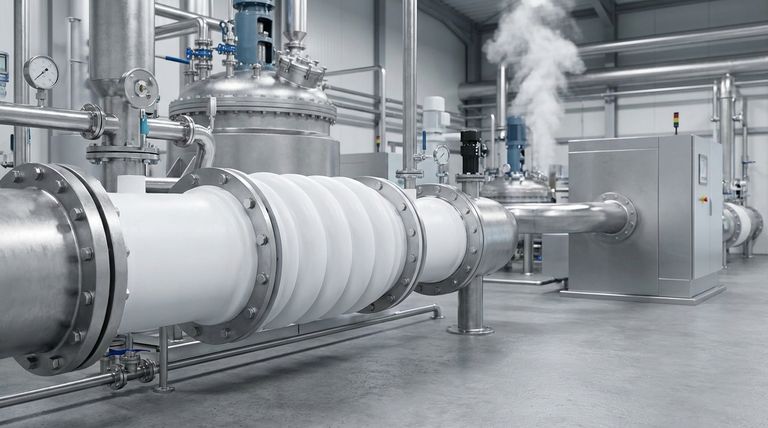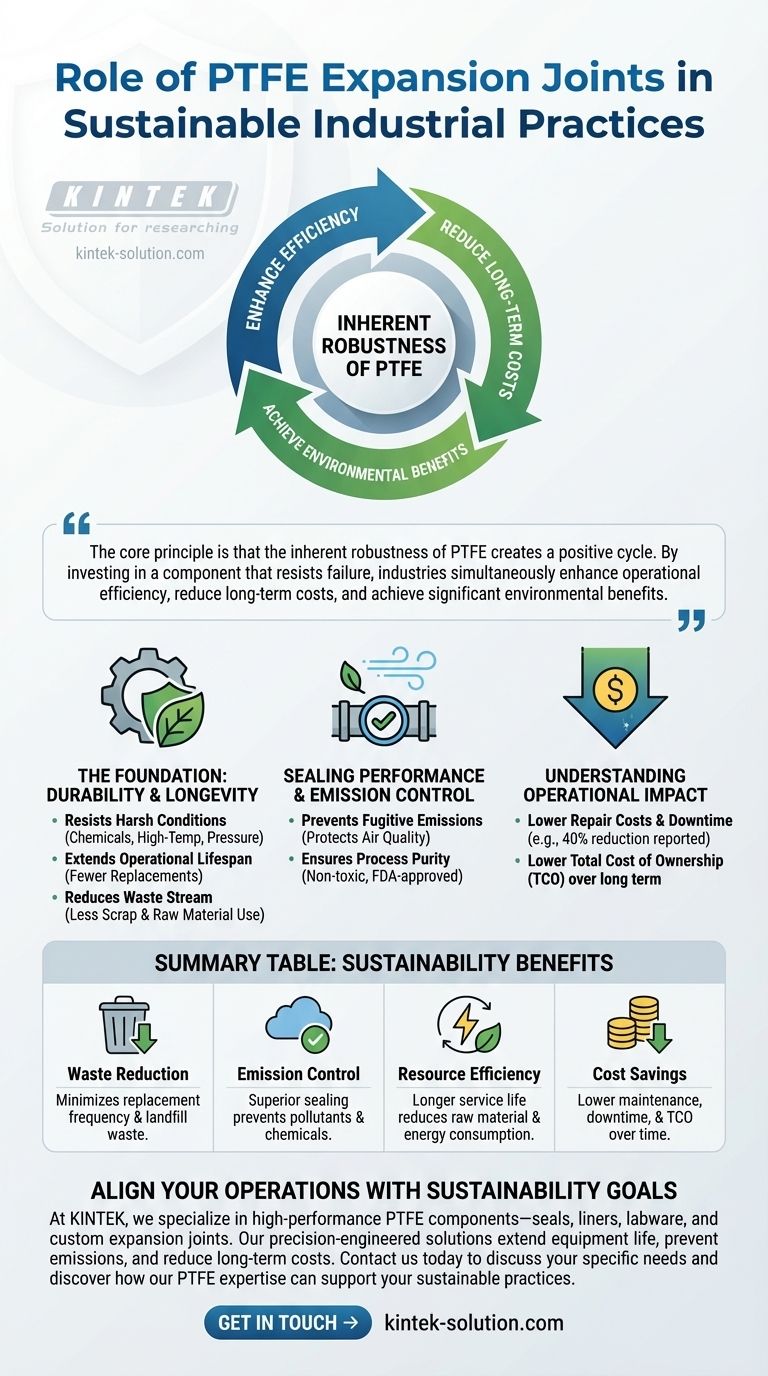In short, PTFE expansion joints are a critical component in sustainable industrial practices because their exceptional durability and chemical resistance lead to a longer service life. This directly reduces waste, prevents harmful emissions through superior sealing, and lowers resource consumption associated with frequent replacements and maintenance.
The core principle is that the inherent robustness of PTFE creates a positive cycle. By investing in a component that resists failure, industries simultaneously enhance operational efficiency, reduce long-term costs, and achieve significant environmental benefits.

The Foundation of Sustainability: Durability and Longevity
The primary contribution of PTFE expansion joints to sustainability is their ability to outlast conventional alternatives, especially in demanding environments. This longevity is not a single feature but the result of several key material properties.
Resisting Harsh Conditions
PTFE is renowned for its chemical inertness and resistance to stressors. This makes it an ideal material for handling corrosive chemicals, high-pressure steam, and fluctuating temperatures found in chemical processing, power generation, and pharmaceutical manufacturing.
Unlike traditional materials that degrade under such conditions, PTFE maintains its structural integrity.
Extending Operational Lifespan
Because they resist chemical attack and physical stress, PTFE expansion joints have a significantly longer life expectancy. This resilience means they do not need to be replaced as frequently as joints made from less durable materials.
This extended operational window is the cornerstone of their value in sustainable systems.
Reducing the Waste Stream
A longer lifespan directly translates to a reduction in waste. Fewer replacements mean less scrap material sent to landfills and a lower demand for the raw materials and energy required to manufacture new parts.
Sealing Performance and Emission Control
Beyond durability, the performance of PTFE as a sealing material is a major factor in its environmental credentials. Poorly sealed joints are a common source of industrial pollution.
Preventing Fugitive Emissions
PTFE expansion joints provide improved sealing capabilities that minimize the escape of airborne pollutants and process chemicals. This is critical for meeting environmental regulations and protecting air quality.
By preventing these "fugitive emissions," facilities can operate more cleanly and safely.
Ensuring Process Purity
In industries like food, beverage, and pharmaceuticals, sustainability also involves preventing contamination. PTFE is non-toxic, FDA-approved, and food-safe, ensuring that it does not leach harmful substances into the product.
This material purity protects consumer health and prevents costly product spoilage and waste.
Understanding the Operational Impact
An objective analysis must also consider the operational and financial implications. The benefits of PTFE are not just environmental; they are deeply connected to system efficiency and cost.
The Link Between Reliability and Cost
Due to their toughness and minimal maintenance requirements, PTFE expansion bellows lower repair costs and system downtime. This enhanced reliability is a tangible economic benefit.
For example, one chemical plant reported a 40% reduction in maintenance costs after switching to PTFE bellows, demonstrating a clear return on investment.
Considering Total Cost of Ownership
While the upfront cost of PTFE components may be higher than some alternatives, their longevity and low maintenance needs result in a lower total cost of ownership (TCO).
Viewing the investment through the lens of TCO reveals that the more durable option is often the most economically and environmentally sustainable choice over the long term.
Aligning Material Choice with Your Sustainability Goals
Choosing the right components requires matching their strengths to your specific operational and environmental priorities.
- If your primary focus is reducing waste and resource consumption: The exceptional longevity of PTFE joints makes them the superior choice for minimizing replacement cycles.
- If your primary focus is meeting environmental compliance for air quality: The superior sealing performance of PTFE is critical for preventing fugitive emissions of pollutants.
- If your primary focus is lowering long-term operational costs: The significant reduction in maintenance and downtime offered by PTFE provides a clear path to lower total cost of ownership.
Ultimately, selecting PTFE expansion joints is a strategic decision that aligns system reliability directly with your sustainability objectives.
Summary Table:
| Sustainability Benefit | How PTFE Expansion Joints Deliver |
|---|---|
| Waste Reduction | Exceptional longevity minimizes replacement frequency and landfill waste. |
| Emission Control | Superior sealing prevents fugitive emissions of pollutants and chemicals. |
| Resource Efficiency | Longer service life reduces raw material and energy consumption for manufacturing. |
| Cost Savings | Lower maintenance, downtime, and total cost of ownership (TCO) over time. |
Ready to align your operations with sustainability goals?
At KINTEK, we specialize in manufacturing high-performance PTFE components—including seals, liners, labware, and custom expansion joints—for the semiconductor, medical, laboratory, and industrial sectors. Our precision-engineered PTFE solutions are designed to extend equipment life, prevent emissions, and reduce long-term costs, helping you achieve both environmental and economic benefits.
Contact us today to discuss your specific needs and discover how our PTFE expertise can support your sustainable practices. Get in touch →
Visual Guide

Related Products
- Custom PTFE Parts Manufacturer for Teflon Parts and PTFE Tweezers
- Custom PTFE Parts Manufacturer for Teflon Containers and Components
- Custom PTFE Measuring Cylinders for Advanced Scientific and Industrial Applications
- Custom PTFE Square Trays for Industrial and Laboratory Use
- Custom PTFE Teflon Balls for Advanced Industrial Applications
People Also Ask
- What are the disadvantages of PTFE bushes? Key Limitations for Industrial Applications
- What are the critical factors for proper PTFE gasket installation? Ensure a Leak-Free, Long-Lasting Seal
- What are some specific applications of Teflon coatings in the food industry? Solve Sticking, Buildup, and Efficiency Problems
- Why are PTFE bearings preferred in chemical processing equipment? Unmatched Chemical Inertness for Reliability
- How does CNC turning work for PTFE, and what precautions are necessary? Achieve Precision Machining
- What are the primary industrial applications of PTFE-coated O-rings? Solve Critical Sealing Challenges
- How is virgin PTFE processed into sheets? A Guide to Purity, Performance, and Trade-offs
- What are the key considerations when machining Teflon? Master Precision Machining for Soft Polymers



















